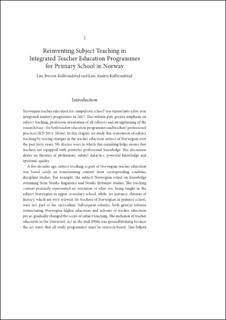Reinventing subject teaching in integrated teacher education programmes for primary school in Norway
Chapter, Peer reviewed
Published version
Permanent lenke
https://hdl.handle.net/11250/2988089Utgivelsesdato
2022Metadata
Vis full innførselSamlinger
Originalversjon
Kapittel 2 i B. Hudson, N. Gericke, C. Olin-Scheller & M. Stolare (Red.) (2022). International Perspectives on Knowledge and Quality.Sammendrag
Norwegian teacher education for compulsory school' was turned into a five-year integrated master's programme in 2017. This reform puts greater emphasis on subject teaching, profession orientation of all subjects and strengthening of the research base - for both teacher education programmes and teachers' professional practices (KD 2014, 2016a). In this chapter, we study this reinvention of subject teaching by tracing changes in the teacher education subject of Norwegian over the past forty years. We discuss ways in which this remaking helps ensure that teachers are equipped with powerful professional knowledge. The discussion draws on theories of professions, subject didactics, powerful knowledge and epistemic quality.
A few decades ago, subject teaching as part of Norwegian teacher education was based solely on transforming content from corresponding academic discipline studies. For example, the subject Norwegian relied on knowledge stemming from Nordic linguistics and Nordic literature studies. The teaching content primarily represented an extension of what was being taught in the subject Norwegian in upper secondary school, while, for instance, theories of literacy, which are very relevant for teachers of Norwegian in primary school, were not part of the curriculum. Subsequent reforms, both general reforms restructuring Norwegian higher education and reforms of teacher education per se, gradually changed the scope of subject teaching. The inclusion of teacher education in the University Act in the mid-1990s was groundbreaking because the act states that all study programmes must be research-based. This helped strengthen subject didactics as a research-based discipline, for example, by funding large research programmes through the Research Council of Norway, and by the Ministry of Education offering PhD grants to teacher education institutions. Another significant change was the growing acknowledgement of teaching as a profession that needs to build on both specialized theoretical knowledge and practical knowledge, and as such is trusted to build practice on professional judgements (Molander and Terum 2008; Utdanningsforbundet 2009).
Multidisciplinarity and content relevant to professional practices are known as the hallmarks of study programmes which are characterized as professional studies (Smeby 2008: 88). Following the master's reform in 2017, teacher education subjects in Norway may be characterized as having been reinvented as professional studies since they are based on specialized knowledge from subject-didactics research as well as from the traditional academic disciplines and include teaching practice. This reinvention of teacher education subjects is shown in the fact that students can no longer have exams in academic discipline studies approved as part of their integrated teacher education, which had been possible up until quite recently. This is because these studies include neither subject didactics nor supervised teaching practice (KD 2016a: 7).
In this discussion, we describe the reinvention of subject teaching as part of integrated teacher education that is the outcome of reforms over the past forty years. We use teacher education for grades 1-7 and the subject Norwegian as our example. We outline its development in the light of theoretical perspectives able to contribute to the understanding of student teachers' professional development, and in terms of theoretical perspectives that further understanding of how content in school subjects is handled as part of teachers' professional practices. We rely on the concepts of theoretical and practical syntheses (Grimen), powerful knowledge (Young) and epistemic quality (Hudson). The overarching question we consider is in which ways can the reinvention of subject teaching in Norwegian teacher education contribute to ensuring that graduate teachers are equipped with powerful professional knowledge.
In the following, we first outline the theoretical perspectives of the study and describe the motivation for the selection of materials and choke of methods. We then present results of the analysis of developments in Norwegian teacher education with a focus on the reinvention of the subject Norwegian chiefly by strengthening of the subject didactics. Finally, we discuss the research question with respect to these results, earlier research and the theoretical perspectives.
Beskrivelse
The book is published by Bloomsbury academic: https://www.bloomsbury.com/uk/international-perspectives-on-knowledge-and-quality-9781350178403/
